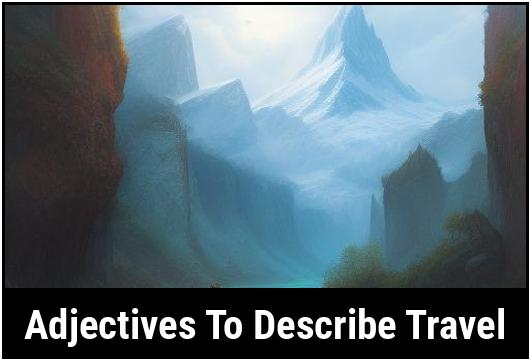- You are here:
- Home »
- adjectives
- » 31 Adjectives To Describe Travel

31 Adjectives To Describe Travel
Traveling can be an enriching and transformative experience, and using the right adjectives to describe it can capture the essence and emotions associated with the journey. Whether it’s the bustling streets of a vibrant city, the serene beauty of a natural landscape, or the cultural immersion in a new destination, adjectives play a pivotal role in conveying the diverse and dynamic nature of travel experiences. In this article, we will explore the significance of using adjectives to describe travel, how to choose the right ones, and the various types of adjectives that best capture the essence of different travel experiences.
Key Takeaways
- Adjectives can vividly convey the sights, sounds, emotions, and overall experience of travel.
- Choosing the right adjectives is essential to accurately depict the unique qualities of different travel destinations and experiences.
- Various types of adjectives, such as descriptive, emotional, and sensory adjectives, can be used to paint a detailed picture of travel experiences.
Adjectives To Describe Travel
1. Enchanting
Travel has a way of captivating our hearts and minds, filling us with a sense of wonder and enchantment. Every new destination has its own unique charm that can leave us spellbound, often exceeding our expectations.
2. Breathtaking
From stunning landscapes to awe-inspiring architecture, travel reveals breath-taking sights that leave us in awe. Standing at the edge of a grand canyon or gazing upon an ancient temple can take our breath away.
3. Exhilarating
The adrenaline rush that comes with trying something new or indulging in thrilling activities is exhilarating. Travel often presents opportunities for adventure sports, like skydiving or bungee jumping, that allow us to push our boundaries and create unforgettable memories.
4. Serene
Travel can also provide us with serene moments of tranquility and peace. Whether it’s walking along a deserted beach or meditating amidst the beauty of nature, these serene moments allow us to find inner peace and escape the chaos of everyday life.
5. Culturally Rich
One of the greatest aspects of travel is the opportunity to immerse ourselves in different cultures. Exploring local traditions, tasting exotic cuisine, and experiencing vibrant festivals allows us to expand our understanding of the world and appreciate diversity.
6. Stunning
Travel introduces us to stunning sights that seem almost too extraordinary to be real. From cascading waterfalls to colorful coral reefs, each destination surprises us with its unique beauty, leaving us speechless.
7. Transformative
Travel is more than just a geographical shift—it is a journey of personal transformation. As we explore new places and encounter different perspectives, we gain a deeper understanding of ourselves and our place in the world.
8. Inspirational
Visiting new destinations and meeting diverse people can serve as a wellspring of inspiration. The stories we hear, the ideas we encounter, and the beauty we witness can spark creativity and open our minds to new possibilities.
9. Vibrant
Travel exposes us to vibrant cultures and lively atmospheres. From bustling markets to colorful festivals, the energy and vibrancy of each destination awaken our senses and make our experiences truly memorable.
10. Adventurous
Stepping out of our comfort zones and embracing new challenges is the essence of an adventurous journey. Travel provides ample opportunities to embrace adventure, whether it’s exploring hidden trails, scuba diving in crystal clear waters, or navigating through bustling cities.
11. Humbling
Travel humbles us by reminding us of how small we are in this vast world. Witnessing the immensity of nature or encountering communities overcoming adversity helps us gain perspective and appreciate the beauty of life.
12. Authentic
Authenticity is often found in the off-the-beaten-path corners of the world. Travel allows us to escape the tourist traps and experience the genuine essence of a destination, immersing ourselves in the local way of life.
13. Joyful
Travel fills our hearts with joy and happiness. Whether it’s witnessing a stunning sunset or sharing laughter with newfound friends, these joyous moments become cherished memories that stay with us forever.
14. Educational
Travel offers a valuable education that cannot be found within the confines of a classroom. From learning about historical landmarks to discovering new cultures and languages, travel broadens our knowledge and fosters a deep sense of curiosity.
15. Welcoming
As we venture into new territories, we often find warm and welcoming communities that embrace us with open arms. Interacting with locals and engaging in their customs makes us feel connected and appreciated, providing a sense of belonging wherever we go.
16. Inspiring
Witnessing incredible acts of kindness and resilience during our travels can serve as a powerful source of inspiration. It reminds us of the goodness present in humanity and can motivate us to be compassionate and live life to the fullest.
17. Majestic
Travel allows us to encounter majestic landscapes that evoke a sense of awe and wonder. From towering mountains to vast deserts, these majestic vistas remind us of the raw beauty of the world we inhabit.
18. Rejuvenating
Sometimes, all we need is a change of scenery to rejuvenate our spirits. Travel provides the opportunity to escape the daily stresses, revitalize our minds, and return home with a renewed sense of energy and purpose.
19. Friendly
When traveling, we often meet friendly faces along the way who are eager to share their stories and make us feel at home. The kindness of strangers can create lasting friendships and remind us of the inherent goodness in humanity.
20. Captivating
Travel has an incredible ability to captivate us, drawing us into new adventures and experiences. Each new destination unveils its own captivating charm, leaving us wanting more and forever yearning to explore further.
21. Exotic
Exotic destinations transport us to vibrant lands far removed from our everyday lives. The allure of exploring cultures, cuisines, and landscapes different from our own can invoke a sense of fascination and enchantment.
22. Eye-Opening
Travel opens our eyes to lives and experiences beyond our own. By witnessing different ways of living, we gain a newfound appreciation for our own lives and cultivate empathy towards others.
23. Memorable
Travel is the quintessential maker of memories. Every journey leaves an indelible mark on our lives, as we collect precious moments and stories that become the fabric of our personal history.
24. Diverse
The world is a tapestry woven with rich and diverse cultures, and travel allows us to discover its myriad threads. From languages to customs, every destination has its unique tapestry that contributes to the vibrant mosaic of humanity.
25. Soulful
Travel touches our very souls, leaving an imprint that lasts long after we return home. Through immersing ourselves in new cultures, connecting with locals, and learning their stories, we experience soul-stirring connections that remind us of our shared humanity.
26. Inspiring
Travel inspires us to discover our passions, seek adventures, and become the best versions of ourselves. The stories we hear, the people we meet, and the transformative experiences we encounter along the way ignite a fire within us to live life to its fullest.
27. Liberating
Leaving behind the familiar and venturing into uncharted territory can be incredibly liberating. Travel gives us the freedom to explore, make choices on a whim, and embrace spontaneity, enabling us to break free from the constraints of routine.
28. Delicious
One cannot discuss travel without mentioning the diverse and delectable cuisines one encounters along the way. From exotic street food to regional delicacies, gastronomy takes us on a tantalizing journey and adds a delicious flavor to our travel experiences.
29. Inspiring
The beauty of travel lies not only in the destinations we visit but also in the people we encounter. Meeting fellow travelers from different backgrounds can be incredibly inspiring, igniting a sense of camaraderie and fostering lifelong friendships.
30. Illuminating
Travel shines a light on different ways of life, expanding our perspectives and challenging our assumptions. By stepping outside our comfort zones, we acquire a greater understanding of the world and our place within it.
31. Self-Reflective
Finally, travel allows us to embark on a deep and introspective journey. By being away from our familiar surroundings, we are prompted to reflect on our values, priorities, and aspirations, guiding us towards personal growth and self-improvement.
Why Use Adjectives To Describe Travel
Adjectives are powerful tools for articulating the nuances of travel experiences. They serve to enrich storytelling, create vivid imagery, and evoke emotional responses in the reader or listener. When describing travel, adjectives help to convey the ambiance, allure, and distinct characteristics of a place or experience. They enable individuals to communicate their perceptions, feelings, and sensory impressions, ultimately providing a more immersive and engaging depiction of their travels.
In addition, adjectives can evoke a sense of nostalgia, inspiration, or wanderlust in the audience by vividly articulating the beauty, grandeur, or cultural significance of a particular destination. Whether it is the bustling energy of a cosmopolitan city, the tranquility of a secluded beach, or the majesty of a mountainous landscape, the right adjectives have the power to transport readers or listeners to the heart of the travel experience.
How To Choose The Right Adjective To Describe Travel
Selecting the appropriate adjectives to describe travel involves considering the specific attributes, ambiance, and emotional impact of a destination or experience. Here are some key factors to consider when choosing the right adjectives:
-
Observation and Perception: Reflect on your personal observations and perceptions of the travel experience. Consider the visual, auditory, olfactory, gustatory, and tactile sensations you encountered and how they made you feel. This will help in selecting adjectives that accurately represent your experience.
-
Emotional Impact: Think about the emotional response elicited by the travel experience. Did it evoke feelings of awe, serenity, exhilaration, or wonder? Choose adjectives that capture the emotional resonance of the journey.
-
Unique Characteristics: Identify the unique characteristics and defining features of the destination or experience. Whether it’s the architecture, landscape, local cuisine, or cultural practices, pinpoint distinctive aspects that warrant descriptive adjectives.
-
Cultural and Historical Context: Consider the historical and cultural context of the destination. Select adjectives that underscore the heritage, traditions, and cultural significance of the place.
-
Audience Perspective: Tailor your choice of adjectives based on the intended audience and their interests. Consider how the adjectives will resonate with readers or listeners and enhance their understanding and appreciation of the travel experience.
Types Of Adjectives For Describing Travel
When describing travel experiences, different types of adjectives can be employed to convey a comprehensive depiction of the destination or journey. These adjectives encompass a wide range of descriptive, emotional, sensory, and contextual facets of travel. Here are the various types of adjectives and how they can be used to articulate different aspects of travel:
Descriptive Adjectives
Descriptive adjectives vividly depict the physical characteristics, visual appeal, and overall ambiance of a travel destination. They provide detailed imagery and insight into the aesthetic qualities of the place. Examples of descriptive adjectives for travel include:
- Majestic: Used to describe awe-inspiring landscapes, historical landmarks, or architectural marvels that evoke a sense of grandeur and magnificence.
- Enchanting: Conveys the captivating and entrancing nature of a place, highlighting its charm, allure, and magical quality.
- Picturesque: Indicates that a location is visually charming, scenic, and visually ideal for photography or artistic representation.
- Quaint: Describes a destination with a charming and old-fashioned appeal, often associated with small villages, cobblestone streets, and traditional architecture.
Emotional Adjectives
Emotional adjectives capture the subjective feelings, sentiments, and experiences associated with travel. They convey the personal and introspective aspects of the journey, providing insight into the emotional impact of the destination. Examples of emotional adjectives for travel include:
- Soul-stirring: Evokes profound emotions and deeply moving experiences, often associated with spiritual or culturally significant destinations.
- Uplifting: Describes experiences that engender a sense of joy, inspiration, and positivity, contributing to personal growth and well-being.
- Nostalgic: Conveys a sentimental longing for past experiences, evoking memories and emotions associated with revisiting familiar places or cherished destinations.
Sensory Adjectives
Sensory adjectives evoke the sensory experiences and perceptions encountered during travel. They articulate the sensory impressions related to sight, sound, taste, touch, and smell, creating a multisensory depiction of the travel experience. Examples of sensory adjectives for travel include:
- Bustling: Portrays the dynamic and energetic atmosphere of urban locations, capturing the hustle and bustle of city life through sensory details.
- Serene: Conveys a tranquil and peaceful ambiance, emphasizing the soothing and calming sensory aspects of natural landscapes or serene settings.
- Invigorating: Describes experiences that are stimulating and energizing, evoking a sense of vitality, freshness, and rejuvenation.
Contextual Adjectives
Contextual adjectives provide insights into the historical, cultural, and geographical context of a travel destination. They underscore the heritage, traditions, and unique qualities that define a place within its broader context. Examples of contextual adjectives for travel include:
- Historic: Indicates the significant historical importance of a destination, reflecting its connection to pivotal events, eras, or cultural heritage.
- Cultural: Describes the richness and diversity of cultural experiences, traditions, and artistic expressions prevalent in a particular destination.
- Idyllic: Conveys the idealized and picturesque nature of a setting, often associated with tranquil countryside or pastoral landscapes.
The use of adjectives to describe travel serves as a powerful means of articulating the essence, allure, and emotional impact of diverse travel experiences. By choosing adjectives that accurately depict the sensory, emotional, and contextual dimensions of a destination, individuals can effectively convey the unique qualities and transformative nature of their journeys. Whether it’s capturing the majestic landscapes, the vibrant culture, or the emotional resonance of a place, adjectives play a crucial role in transporting audiences to the heart of the travel experience. With a nuanced understanding of the types and significance of adjectives for describing travel, individuals can enrich their storytelling, evoke profound emotions, and inspire others to embark on their own remarkable journeys.
Examples Of Adjectives For Different Types Of Travel
When it comes to describing travel experiences, using the right adjectives can make all the difference. Adjectives serve the purpose of adding depth and detail to our descriptions, enabling us to paint a vivid picture of our adventures. From thrilling and exhilarating to tranquil and picturesque, adjectives help us convey our emotions and sentiments about a particular destination.
Travel can encompass a broad range of experiences, from leisurely vacations to adventurous expeditions. Let’s take a look at some examples of adjectives that can be used to describe specific types of travel:
Adventurous Travel
- Thrilling: Embarking on a white-water rafting adventure in the Grand Canyon can be thrilling.
- Exciting: Exploring the dense jungles of the Amazon is always exciting.
- Exhilarating: Skydiving over a picturesque landscape can be an exhilarating experience.
- Intrepid: Hiking up the rugged slopes of Mount Everest requires an intrepid spirit.
Relaxing Travel
- Tranquil: Lounging on a pristine beach with crystal-clear turquoise waters is a tranquil experience.
- Serene: Meditating in a peaceful garden surrounded by cherry blossoms is a serene moment.
- Rejuvenating: Enjoying a massage at a luxurious spa resort can be rejuvenating.
- Soothing: Taking a soothing hot bath in a natural hot spring can help relieve stress.
Cultural Travel
- Captivating: Visiting ancient ruins and learning about their history can be a captivating experience.
- Enriching: Attending a traditional dance performance can be an enriching cultural experience.
- Eye-opening: Exploring local markets and tasting exotic cuisines can be an eye-opening experience.
- Insightful: Participating in a traditional tea ceremony can provide insightful glimpses into local customs and traditions.
Educational Travel
- Informative: A guided tour of the Louvre Museum in Paris is highly informative.
- Enlightening: Attending a scientific conference can be an enlightening experience.
- Educational: Studying marine life during a scuba diving course is both educational and exciting.
- Stimulating: Participating in a workshop on indigenous art can be a stimulating experience.
Family-Friendly Travel
- Fun-filled: A family vacation at a theme park can be a fun-filled adventure for everyone.
- Memorable: Creating lifelong memories during a family road trip is indeed memorable.
- Bonding: Going on a camping trip together can foster bonding among family members.
- Cherished: Celebrating holidays in a cozy cabin surrounded by loved ones is a cherished experience.
Culinary Travel
- Gastronomic: Indulging in a seven-course gourmet meal at a Michelin-starred restaurant is a gastronomic delight.
- Flavorful: Exploring street food markets in Thailand offers a chance to taste flavorful dishes.
- Delectable: Savoring the rich flavors of a homemade pasta dish in Florence is truly delectable.
- Exquisite: Enjoying a wine tasting tour in Bordeaux allows you to sample exquisite wines.
Common Mistakes In Using Adjectives To Describe Travel
While adjectives can significantly enhance our travel writing, there are a few common mistakes to avoid to ensure their effective use.
Overusing Generic Adjectives
One of the most common mistakes is relying too heavily on generic adjectives that lack specificity. Words like "good," "nice," or "beautiful" can be quite subjective and fail to provide readers with a detailed picture of the travel experience. Instead, opt for more descriptive and precise adjectives that aptly capture the essence of your experience.
For example, instead of saying a beach is "nice," you could describe it as "pristine," "secluded," or "idyllic."
Ignoring The Setting And Context
Another mistake is failing to consider the specific setting and context when selecting adjectives. The same adjective may not have the same impact depending on the location or type of travel experience. For instance, using the adjective "exciting" to describe a leisurely stroll through a museum might not accurately reflect the atmosphere.
Ensure that the selected adjectives align with the overall context and setting of your travel experience.
Lack Of Variety And Balance
Using the same adjectives repeatedly can make your writing monotonous and dull. Aim to incorporate a variety of adjectives to provide readers with a well-rounded view of your travel experience. Additionally, striking a balance between positive and negative adjectives can create a more realistic portrayal of the place you visited.
Inconsistency In Tenses
Maintaining clarity and consistency in tenses is vital when using adjectives. Ensure that the tense of the adjective matches the rest of your sentence structure. Mixing past, present, and future tenses can confuse readers and weaken the impact of your descriptions.
Superlatives Without Supportive Evidence
While superlatives can be powerful when describing travel experiences, it is essential to back them up with supportive evidence. Simply stating that something is the "best" or the "most beautiful" without providing specific details or examples might come across as exaggerated or insincere. Always strive to provide context or anecdotes that substantiate your claims.
Using Adjectives Effectively
To effectively use adjectives while describing travel experiences, consider the following tips:
1. Be Specific And Precise
Instead of relying on generic adjectives, be specific and precise in your descriptions. Use adjectives that provide sensory details and evoke emotions. For example, instead of saying a hike was "challenging," you could describe it as "steep," "treacherous," or "arduous." The more detailed and specific you are with your adjectives, the better your readers will be able to envision your travel experience.
2. Consider The Five Senses
When selecting adjectives, consider the five senses – sight, sound, smell, taste, and touch. Including sensory details can bring your descriptions to life and make your travel writing more engaging. For example, instead of saying a market is "crowded," you could describe it as "vibrant," "bustling," or "fragrant," appealing to both sight and smell.
3. Use Comparative And Superlative Forms
Comparative and superlative forms of adjectives can add depth and nuance to your descriptions. Comparatives are used to compare two things, while superlatives are used to emphasize the highest degree of something. For example, instead of saying a beach is "beautiful," you could say it is "more beautiful" than another beach or the "most beautiful" beach you’ve ever seen.
4. Include Adverbs And Adverbial Phrases
Adverbs and adverbial phrases can modify adjectives and provide additional information about the action, manner, or intensity of the adjective. Including these can enrich your descriptions and make them more vivid and dynamic. For example, instead of saying a sunset is "beautiful," you could say it is "breathtakingly beautiful" or "stunningly beautiful."
5. Appeal To Emotions
Adjectives have the power to evoke emotions and create a connection with your readers. Consider the emotions you want your travel writing to elicit and select adjectives that align with those emotions. For example, instead of saying a mountain view is "nice," you could say it is "awe-inspiring" or "majestic," which conveys a sense of wonder and appreciation.
6. Use Adjectives To Create Contrast And Comparison
Adjectives can be used effectively to create contrast and comparison in your travel writing. Contrasting adjectives can highlight differences and make descriptions more vivid. Comparisons can help readers relate to your experiences by providing familiar reference points. For example, instead of saying a city is "modern," you could say it is a "blend of modern skyscrapers and historic architecture," creating a vivid contrast.
Exercises And Practice
To enhance your ability to use adjectives effectively in travel writing, here are some exercises and practice activities:
1. Descriptive Writing Exercise
Choose a memorable travel experience and write a descriptive paragraph using adjectives to bring the experience to life. Focus on using specific and precise adjectives that appeal to the senses and evoke emotions. Experiment with comparative and superlative forms, as well as adverbs and adverbial phrases, to enhance your descriptions.
2. Adjective Replacement Exercise
Take a piece of your travel writing and identify any generic or overused adjectives. Replace them with more specific, vivid, and nuanced adjectives. Consider the emotions and sensory experiences you want to convey and select adjectives that align with those intentions. Compare the original and revised versions to assess the improvements.
3. Comparative And Superlative Exercise
Choose a destination or experience and write a paragraph comparing it to another similar destination or experience. Use comparative and superlative forms of adjectives to highlight differences or emphasize the highest degree of something. Ensure that the comparisons are relevant and enhance the readers’ understanding or appreciation of the destination or experience.
4. Colorful Adjective Game
Gather a list of adjectives that evoke different colors or visual imagery, such as "vibrant," "dazzling," or "picturesque." Select a destination or experience and challenge yourself to incorporate these colorful adjectives into your travel writing. Focus on creating vivid and evocative descriptions that transport readers to the location.
Conclusion
Adjectives play a crucial role in travel writing by enabling us to capture and convey the essence of our experiences. Through the use of specific, precise, and evocative adjectives, we can transport readers to different destinations and immerse them in our adventures. By avoiding common mistakes and implementing effective techniques, we can elevate our travel writing and create captivating narratives that inspire and engage.
Remember to be mindful of your selection of adjectives, considering the context, setting, and desired emotions you want to elicit. Continually practice using adjectives in your travel writing, experiment with different techniques, and always strive for clarity and impact. With time and effort, you can master the art of using adjectives to perfectly describe your travel experiences.
FAQS On Adjectives To Describe Travel
What Are Some Adjectives To Describe Adventurous Travel?
Exciting, daring, exhilarating, intrepid, daring.
Can You Suggest Some Adjectives To Describe Luxurious Travel?
Opulent, lavish, indulgent, extravagant, pampering.
What Are Some Adjectives To Describe Budget-friendly Travel?
Economical, budget-conscious, thrifty, frugal, affordable.
Are There Any Adjectives To Describe Cultural Travel?
Immersive, insightful, enlightening, enriching, authentic.
Can You Provide Some Adjectives To Describe Off-the-beaten-path Travel Experiences?
Unconventional, unique, unconventional, non-touristy, undiscovered.








